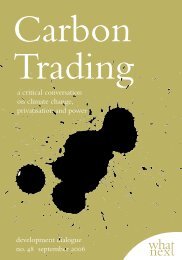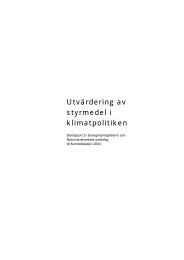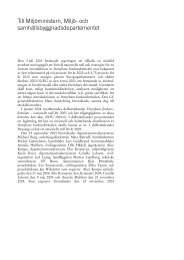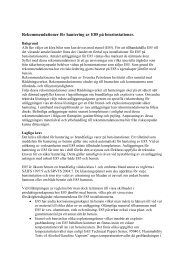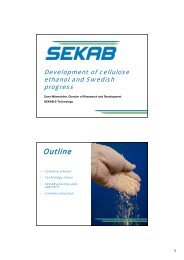Sugarcane ethanol: Contributions to climate change - BAFF
Sugarcane ethanol: Contributions to climate change - BAFF
Sugarcane ethanol: Contributions to climate change - BAFF
You also want an ePaper? Increase the reach of your titles
YUMPU automatically turns print PDFs into web optimized ePapers that Google loves.
Chapter 9<br />
in mechanical aid for the harvesting, in which a machine is used for cutting the cane<br />
and workers are used <strong>to</strong> gather the crops. As the cutting of the cane is the hardest part<br />
physically, the authors argue this system would also contribute <strong>to</strong> opening up the labour<br />
force for women.<br />
All in all, although recognising that many of the above mentioned issues are not exclusive<br />
for sugarcane bio<strong>ethanol</strong>, employment generation that leads <strong>to</strong> e�ective poverty reduction<br />
requires addressing these problems.<br />
3.6. Government support<br />
Experience suggests the biofuels sec<strong>to</strong>r requires some form of policy support, at the very<br />
least in the initial phases development. Even Brazil, the most e�cient biofuel producing<br />
country, still maintains a signi�cant tax di�erential between gasoline and hydrous <strong>ethanol</strong><br />
<strong>to</strong> promote the sec<strong>to</strong>r (ESMAP, 2005b) and �xes a manda<strong>to</strong>ry blend (between 20% <strong>to</strong><br />
25%). More generally, the PROALCOOL programme in the past required heavy support.<br />
Between 1975 and 1987 it produced savings for US$ 10.4 billion but it costs were US$ 9<br />
billion (World Watch Institute, 2006). Moreover, with falling oil prices, rising sugar prices,<br />
and a national economic crisis the programme simply became <strong>to</strong>o expensive and collapsed<br />
by end of 1980s.<br />
In many countries, the main rationale behind biofuels production is <strong>to</strong> decrease the costs<br />
associated with imported fossil fuels. Among the costs of such a policy that need <strong>to</strong> be<br />
accounted is the foregone duty on fuel imports, which results in a decline in government<br />
revenues. For instance, in Brazil, the forgone tax revenue in the state of São Paulo, which<br />
accounts for more than one-half of the <strong>to</strong>tal hydrous <strong>ethanol</strong> consumption in the country, was<br />
about US$ 0.6 billion in 2005 (ESMAP, 2005b). In many developing countries a substantial<br />
portion of public revenues are derived from import duties. In addition, the diversion of sugar<br />
exports for bio<strong>ethanol</strong> production for domestic markets means that countries may su�er<br />
reductions in their export earnings. All these pose signi�cant challenges in poorest countries,<br />
where there are a multitude of urgent needs competing for scarce �scal resources.<br />
Another issue is that once granted and the biofuel industry has been launched, subsidies<br />
are di�cult <strong>to</strong> withdraw. A major challenge <strong>to</strong> reduce policy support is the vested interests<br />
created in the domestic industry (Henniges and Zeddies, 2006).<br />
On the other hand, the existence of contentious domestic policies and practices can<br />
undermine industry development. For instance, Ra� Khan et al. (2007) and Gonsalves<br />
(2006a) report the negative e�ects on bio<strong>ethanol</strong> development of policy measures such as a<br />
high central excise duty and sales tax on alcohol that exist in Pakistan and India, respectively.<br />
�e lack of policy provenance - re�ected by the fact that the Pakistani government directed<br />
the Petroleum Ministry (who houses the oil lobby) <strong>to</strong> develop the bio<strong>ethanol</strong> conversion plan<br />
216 <strong>Sugarcane</strong> <strong>ethanol</strong>




